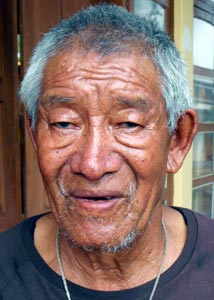Name: Sither Tsering
(Alias: No)
Gender: Male
Interview Age: 76
Date of Birth: 1934
Birthplace: Dawa Zong, Utsang, Tibet
Year Left Tibet: 1967
Profession: Dairy Farming, Farming
Monk/Nun: No
Political Prisoner: No

Interview No.: 62M
Date: 2010-04-06
Language: Tibetan
Location: Doeguling Settlement, Mundgod, Karnataka, India
Categories: Chinese Invasion and Occupation
Keywords: childhood memories, Chinese -- first appearance of, Chinese rule -- life under, customs/traditions, escape experiences, festivals, forced labor, herding, monasteries -- destruction of , taxes, thamzing/struggle sessions, Utsang
Summary:
Sither Tsering's family was samadok 'farmers and herders.' His family owned 60-70 yaks and over 400 sheep. He started working around the age of 14-15, dividing his time herding, trading and farming. His middle-class family lived in a tent made from yak hair. They were obliged to pay an animal tax called sog-tel based on every unit of one yak and six sheep. The tax was paid in money and if it could not be paid then animals were taken by the government. Villagers also cared for the local monastery's sheep and repaid the monastery in lambs and butter.
The Chinese first appeared around 1947-48 in Sither Tsering's village. He describes their uniforms and explains how they repealed the taxes, distributed of dhayen 'silver coins' and conferred titles like u-yon 'leader' on the poor people. Then he describes the gradual change in the attitude of the Chinese, the destruction of the holy Buddhist images in the Tholing and Dawa Monasteries and thamzing 'struggle sessions' conducted on the abbot and others.
Sither Tsering and the villagers felt they were "left in a void" after His Holiness the Dalai Lama escaped in 1959, but he remained in Tibet until 1967 because his village had not been as affected by the Chinese occupation as Lhasa. He escaped through the Wuri mountain pass with his yaks before reaching India. He describes his marriage that took place before leaving Tibet.
Interview Team:
- Rebecca Novick (Interviewer)
- Ronny Novick (Videographer)
- Namgyal Tsering (Interpreter)

